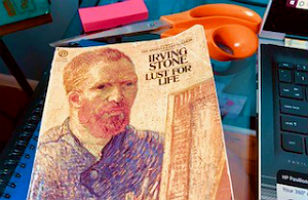
My mother was an artist, so I grew up in a house piled high with paints, canvases, easels, glazes, frames, art books and more. In fact, when I moved out of my parents’ house in the late 90s, she turned my bedroom into her art studio. I’m writing in that room now, and I can feel her creative mojo here still.
While my mother worked in paint and ceramics (and sometimes music notes), I work in words. But honestly, no matter the medium, the struggles are often the same. My husband is a chef and my son is a songwriter. We all still get blocked creatively sometimes and get nervous when someone views our work.
I recently finished reading Irving Stone’s Lust for Life. Published in 1934, the novel is a fictionalized account of Vincent Van Gogh’s growth and struggles as an artist. Van Gogh dabbled in other professions before becoming obsessed with art and pouring hundreds of hours a week into honing his craft and trying to find his unique artistic voice. Quite simply, it drove him mad.
Most would say I still have my wits about me, yet there are several passages in the novel that struck a chord. Here are a few:
“Whatever you do, you will do well. Ultimately, you will express yourself and that expression will justify your life.”
“I can’t draw a figure without knowing all about the bones and muscles and tendons that are inside it. And I can’t draw a head without knowing what goes on in that person’s brain and soul. In order to paint life one must understand not only anatomy, but what people feel and think about the world they live in. The painter who knows his own craft and nothing else will turn out to be a very superficial artist.”
“Do you call yourself an artist?”
“Yes.”
“How absurd. You never sold a picture in your life.”
“Is that what being an artist means — selling? I thought it meant one who was always seeking without absolutely finding. I thought it meant the contrary from ‘I know it, I have found it.’ When I say I am an artist, I only mean ‘I am seeking, I am striving, I am in it with all my heart.'”
“The artist has the liberty to exaggerate, to create in his novel a world more beautiful, more simple, more consoling than ours.” (Attributed to Maupassant)
“Then you like it?”
“As for that, I cannot say. I only know that it makes me feel something, in here.”
He ran his hand upward over his chest.
Many resources recommend writing what you know. I agree, to an extent. As creatives, we must also grow outside our walls, our comfort zones, our experiences to bring in new inspiration – and a little whimsy.
What books have inspired your work? What phrases speak to your craft?
